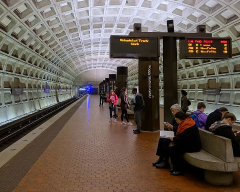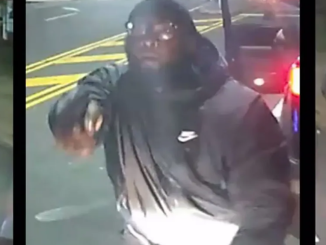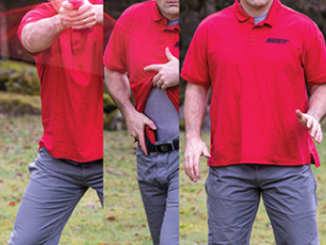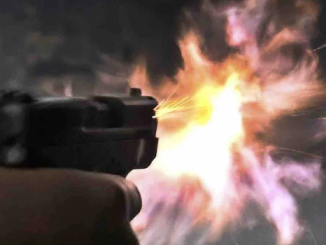
The Metro, which is Washington, D.C.’s subway, is a gun-free zone where even concealed carry permit holders cannot carry their weapons. However, that law did not stop a man with an illegal gun from reportedly shooting three people and killing one older man at a D.C. Metro station during morning rush hour last week. The rampage was only stopped when unarmed citizens tackled him, threw his gun onto the tracks, and restrained him on the platform until police arrived.
Isaiah Trotman, 31, was arrested and charged with first-degree murder. He allegedly killed Robert Cunningham, the 64-year-old Metro mechanic who tried to save a woman from being attacked.
Concealed Carry Banned on Metro
The horrific crime spree Wednesday may bring new support for a lawsuit challenging the District for banning carry permit holders from bringing loaded guns on the city’s public transportation.
“It’s about time we realize that law-abiding citizens have a right to defend themselves and should not be defenseless to a lunatic when riding the Metro,” George Lyon, who is the attorney for the four plaintiffs in Angelo v. District of Columbia, told me in an interview.
“I think this shooting illustrated that the Metro can be a dangerous place,” added Lyon, whose firm is Arsenal Attorneys. “There is no method of determining if somebody is there for nefarious purposes and carrying an illegal weapon.”
After the shooting spree ended, Lyon filed an amended complaint in the carry permit lawsuit to “beef up our claim for standing.” D.C. Attorney General Brian Schwalb has 30 days to respond. Lyon said he may also file again for a new preliminary injunction based on the Second Amendment to allow the lawful carrying on the Metro in light of the horrific crime. Schwalb’s office did not respond to a request for comment.
D.C. law says that Metro stations, trains, and buses are “sensitive places” where lawful people cannot concealed carry. Mayor Muriel Bowser said the multiple shootings on the Metro are caused by guns themselves.
The mayor was asked by a reporter about the rush-hour rampage causing people to not feel “comfortable” riding the Metro.
“We’re focused on how we get guns out of our city,” said Bowser. “Whether it’s the Metro, it’s the street, it’s individual homes — we know that we have guns that are creating tragedies in our city and in our nation.”
Subways as ‘Sensitive Places’
Angelo and the others filed the suit in June 2022 after the Supreme Court’s decision in New York State Rifle and Pistol Association v. Bruen. In that landmark ruling, the court narrowed what can be considered a “sensitive place” where guns are banned, citing only three that have historical context (polling places, legislative buildings, and courts). The ruling, written by Justice Clarence Thomas, warned that while gun control laws can make other places “sensitive,” they cannot expand the category of sensitive places “simply to all places of public congregation that are not isolated from law enforcement.”
In response, New York Gov. Kathy Hochul signed a new law that made public transportation, including the subways, into “sensitive” places where concealed carry is banned. That is being challenged in a federal lawsuit in the Second Circuit Court of Appeals. In January, the Supreme Court denied a request to get involved in the case. Justices Thomas and Samuel Alito said the decision was for procedural reasons and not to endorse the merits of the law.
Disarming Law-Abiding Citizens but Not Criminals
The four plaintiffs in the lawsuit — Gregory Angelo, Tyler Yzaguirre, Cameron Erickson, and Robert M. Miller — assert that their Second Amendment rights are being violated every day because they are not allowed to carry loaded guns on the cost-effective Metro. The men all have D.C. concealed carry permits and take the Metro on a regular basis.
Three of them live in D.C. and Miller lives in neighboring Virginia, where the Metro allows for legal gun carrying on its trains, following state law. Carry permit holders on trains from Virginia are supposed to unload their guns and put them in a case when they hit the District stations.
U.S. District Judge Randolph Moss, a Barack Obama appointee, denied the plaintiffs’ motion for injunctive relief in December. Moss ruled that the four men don’t have standing in the case because they can’t prove a “credible threat of prosecution” — meaning none of them have been threatened with arrest. Lyon’s new motion addresses that issue.
Legal carry permit holders are afraid to carry guns on the Metro because it’s against the law. However, that was not a concern for the alleged murderer, Trotman. I asked a spokesman for the Metropolitan Police Department (MPD) if Trotman’s gun was registered with the city — that’s the only way it can be legal — but did not get a reply. An MPD spokesman also declined to say if Cunningham was armed or if anyone at the crime scenes had a concealed carry permit, citing the case being under investigation.
Perhaps if a good guy with a gun and a legal carry permit had been at the Potomac Station that morning, he would have been able to stop the assailant before he allegedly murdered the unarmed hero, Mr. Cunningham.
* Article from: The Federalist


